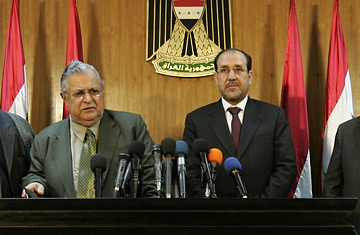
Iraqi President Jalal Talabani (left) and Prime Minister Nouri al-Maliki meet with the press on January 14. The Iraqi Parliament has rewritten the law that forbid former members of the Ba'ath Party to apply for jobs in the government and military.
On Saturday afternoon in central Baghdad, Iraq's often raucous Parliament did something out of character. It voted to pass an actual piece of legislation. Just over half of the 275 members of Iraq's parliament voted in favor of a new de-Ba'athification law after months of obstruction by hard-line Shi'ites, effectively rolling back the previous order set by the American administration in 2003.
The previous de-Ba'athification law barred tens of thousands of government employees from their jobs. Most had become members in the socialist Ba'ath party not for ideological reasons but because party membership was a prerequisite to professional advancement under Saddam Hussein. Those who lost their jobs viewed the measure as collective punishment.
Those employees were the backbone of the government — its experts and its technocrats. Their disenfranchisement fueled the flames of the brewing anti-U.S. insurgency. But Saturday's vote is an important step towards bringing them back into the fold and bridging the divide between the Shi'ite-dominated government and the Sunni minority that prospered under Saddam.
The law, known as the Justice and Accountability Law, has 30 clauses and was broadcast on televisions, radios and in newspapers across the country. It will allow all but a few thousand former Ba'ath party members to apply for government jobs and the military. Those still barred will at least receive their government pensions, which were previously revoked. The new law also allows victims of oppression under Saddam to sue Ba'ath party members for compensation.
Even though the former Ba'athists are now allowed back to work, some Sunni Iraqis view government ministries as bastions of Shi'ite power, where Sunnis are unwelcome. The distrust goes both ways. Falah Shanshal, a Shi'ite MP suspects that the new law will "allow the Ba'ath party members to regain control of sensitive positions in the government. This we will not allow."
Parliament usually receives pretty low marks from average Iraqis — it's not uncommon to hear them all referred to as a "bunch of thieves." But this piece of legislation has largely been welcomed. "It's the best law they've passed so far," says Ahmed Hashim Mohammad, an Iraqi army captain-turned-insurgent who now works on the U.S. payroll as a checkpoint leader in a neighborhood watch, part of the Sunni "awakening movement" that has been key to restoring order in al-Qaeda-infested areas.
Saturday's vote may also hail the end to the political deadlock that started last August when the main Sunni Arab bloc pulled out of Shi'ite Prime Minister Nouri al-Maliki's government. On Monday a main Sunni bloc said it was prepared to return to Maliki's government, largely as a result of the vote on Saturday. But certain demands remain in place. Chief among them is the release of detainees.
The U.S. military currently holds about 25,000 detainees at its facilities in Iraq. More than 80% of the detainees are Sunni, according to the military. Roughly 24,000 other people, mostly Sunnis, are being held in Iraqi jails, where their fate remains uncertain. In December, Maliki's cabinet approved a draft law that could free thousands of these prisoners, many of whom were taken in during counter-terrorism sweeps flowing from surge operations. But the Parliament has yet to decide on the measure.
Salim al-Jubori, spokesman for the Accordance Front, the main Sunni bloc, stressed that resolving the detainee issue is key to coming up with a deal that would allow a Sunni return to the government. So far it does not look good. Speaking about the detainees, al-Jubori said: "This is our main demand. Unfortunately, we are not seeing any kind of flexibility from the government."
For its part, the U.S. has been full of praise for the Iraqi parliament vote on Saturday. An official with the embassy in Baghdad says: "We don't see this so much as a vote on old policies than as a vote on Iraq's future," even though the vote was a clear reversal of policy introduced by Bush's hand-picked Iraq czar in 2003, L. Paul Bremer III. It was one of a handful of laws the U.S. was eager to see Iraq's Parliament tackle. Others are the oil law, the election law and a provincial powers law. "All of these will help to build a political climate conducive to genuine reconciliation."
A more important step towards bridging the gap would be justice for the thousands of families who lost a loved one to a Shi'ite death squad or a Sunni suicide bombing. Talking about the horrific violence that has gripped Iraq in the past four and a half years — and the decades before that — and bringing those responsible to justice, would be a more meaningful step towards peace and justice than a paycheck or a pension. With reporting by Mark Kukis and Mazin Ezzat/Baghdad
